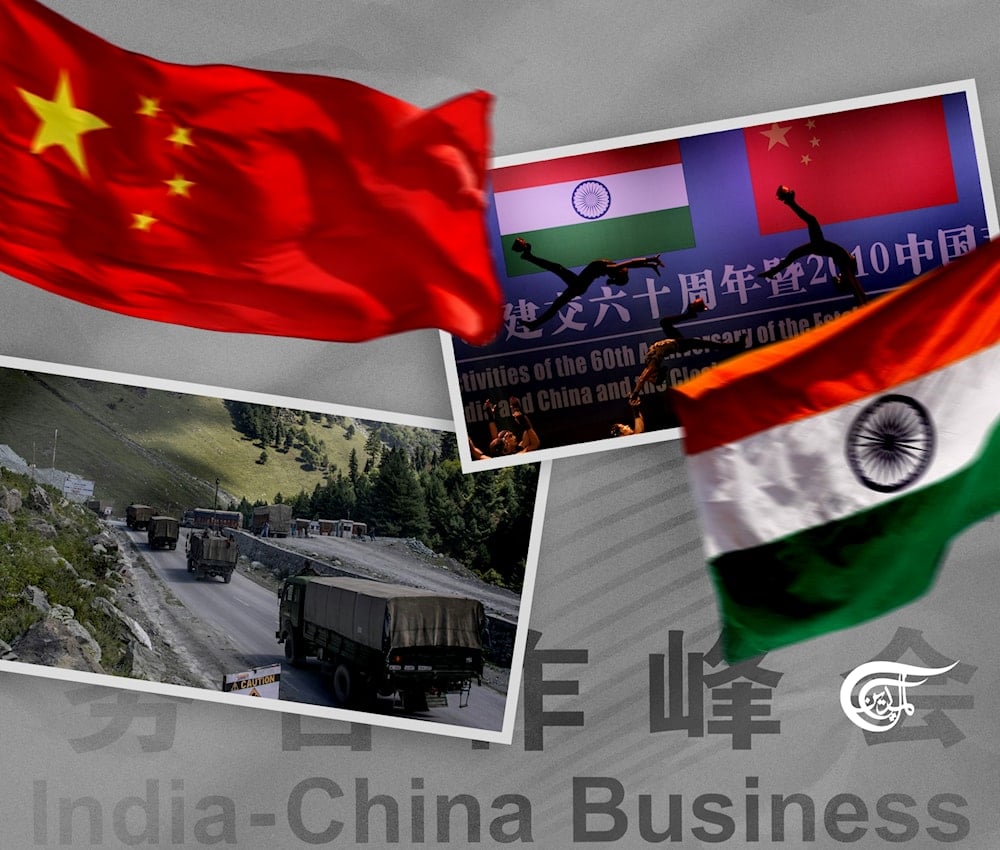India Needs To Reset Its Ties with China Instead Of Relying On America
It is hoped that India and China should work to normalize their derailed ties by increasing economic, political, and strategic cooperation as well as people-to-people exchange.
-

India Needs To Reset Its Ties with China Instead Of Relying On America (Illustrated by Mahdi Rteil to Al Mayadeen English)
The official diplomatic journey of India and China, the two big neighbouring countries and ancient civilizations in Asia started on April 1, 1950, when India being the first non-socialist country recognized the newly-born People’s Republic of China as a sovereign country. During their remarkable journey spanning over seven decades, these two countries have maintained a cordial and close friendship through state-level visits while a burgeoning trade and economic partnership as well as people-to-people and cultural ties have contributed to further blossoming their bilateral bonding.
But no one can dispute that the unfortunate bloodshed in the 2020 Galwan Valley clash between the Indian and Chinese border troops at the Line of Actual Control (LAC) in the Ladakh region decimated the India-China relationship. Since then, India has reiterated that the border situation will determine the status of its relations with its northern neighbour until normalcy is restored along the LAC.
On June 11, 2024, after taking charge as India's External Affairs Minister for a second consecutive term in the Prime Minister Narendra Modi's 3.0 cabinet, Subrahmanyam Jaishankar told Indian journalists: “Our focus regarding China will be on finding solutions to border issues, while with Pakistan, we aim to address the longstanding issue of cross-border terrorism.” Jaishankar's comments clearly indicate that India will take a seemingly hard line against China to resolve the border dispute with China. There is no disputing that the Doklam (Donglang) standoff in 2017 and the Galwan Valley standoff in 2020 led to a sharp decline in India-China relations and significantly affected the socio-economic conditions of over 2.7 billion people residing on either side of the Himalayas.
Aftermath of the Galwan Valley Clash:
It’s really unfortunate that despite a plethora of bilateral agreements on border-related issues, the two countries have not yet reached a complete agreement on the disengagement of troops from all friction points at the disputed LAC in Ladakh. After rounds of talks between military commanders and diplomatic meetings between India and China failed to produce any dramatic breakthroughs, questions continue to haunt Indian and Chinese people alike: How can the two countries manage to improve their ties? Will the sour political and diplomatic relations become the normal state between the two countries? More importantly, what does the Galwan Valley clash signify for the future of Sino-Indian relations?
Right after the Galwan Valley clash, Indian policy towards China entered a dangerous phase when the Narendra Modi-led Bharatiya Janata Party (BJP) government adopted punitive measures such as imposing a range of economic measures against Chinese firms and banning a set of mobile apps linked to China. The Indian political leadership has accelerated its strategic tilt toward the United States and echoing the words of US President Joe Biden, painted China as an “expansionist.” On June 21, 2020, India introduced new “Rules of Engagement” for the border areas that give its commanders “complete freedom of action” along the LAC. India’s sedulous courtship of the United States, resuscitation of the Quadrilateral Security Dialogue (Quad), and cancellation of public contracts with Chinese firms do not promote healthy and stable development of its relations with China. Rather, such a trend could derail India’s dream of becoming a “US$5 trillion economy”.
The Quad Keeps Eye on China:
It should be mentioned here that the dialogue of the four Quad foreign ministers from Australia, India, Japan, and the United States and the joint statement of the Quad meeting in Tokyo, Japan on July 29, 2024, have clearly shown that it is directed against China to contain the country’s rise in the Indo-Pacific region, currently the most active region in the global geopolitical landscape under the leadership of President Biden. The Quad foreign ministers expressed serious concerns over China’s intimidating actions in the South China Sea and pledged to enhance maritime security and stability in the region. Since becoming Indian Prime Minister in 2014, Modi has been working closely with the United States under former U.S. President Donald Trump and current President Biden to check Chinese adventurism and militarization in the frame of Indo-Pacific strategy, including the South China Sea. In terms of security issues, India is more concerned about China’s presence in the Indian Ocean and the defense cooperation between China and Pakistan. The Narendra Modi-led government believes that an alliance with America is in its best interests.
However, on July 29, Chinese Foreign Ministry Spokesperson Lin Jian condemned the joint statement of the Quad Foreign Ministers’ Meeting for chanting “a free & open Indo-Pacific” by stating that "Some countries outside the region have frequently sent advanced military aircraft and vessels to the South China Sea to flex their muscles and create tension, and have formed various groupings and incited division and confrontation in the region, all of which make them the biggest threat and challenge to regional peace and stability." He also condemned the Quad as an exclusive group that incites antagonism and confrontation and hinders the development of other countries.
It is indeed surprising that India, despite being a member of the Shanghai Cooperation Organization (SCO) and BRICS, is irritating China by joining a part of the U.S.-led security alliance against China. Notably, India is going to host the Quad Leaders’ Summit later this year. India should not be overly fascinated by the U.S.’s strategic approach to China. India’s foreign policy cannot be dictated by the U.S.
Returning India-China Relations to Normal:
Amid continuing border standoff between the two countries, Indian Foreign Minister S Jaishankar met his Chinese counterpart Wang Yi on July 25, on the sidelines of the ASEAN Foreign Ministers' Meeting in Vientiane, the capital of Laos, and discussed various aspects of bilateral collaboration, including resolving the border disputes as soon as possible. After the meeting with Wang, the Indian foreign minister said in a post on X: “The state of the border will necessarily be reflected in the state of our ties.”
On the other hand, emphasizing the daunting global challenges, the Chinese foreign minister stressed that the two countries should increase understanding and mutual trust for mutually beneficial cooperation. It is to be noted that the two foreign ministers earlier met on the sidelines of the Shanghai Cooperation Organization (SCO) meeting in Astana, Kazakhstan on July 4 and agreed to work to defuse the border tensions. On both occasions, Wang emphasized that China values its friendship with India and will work to manage its differences with its neighbour.
Obviously, the two ministers exhibited both hope and confidence in relations between Asia's two biggest countries. More importantly, Jaishankar insisted that India was “not looking to other countries to sort out” the ongoing border dispute with China during the Quad Foreign Ministers’ Meeting on July 25 in Japan. Indian foreign minister is right. India is an independent major country. Its normal relations with China should not be a target for external interference from a third party.
India needs China, China needs India:
The Economic Survey 2024, authored by India’s Chief Economic Adviser V Anantha Nageswaran, outlined that it is inevitable for India to plug itself into the global supply chain without increasing imports from China and also said that allowing foreign direct investment (FDI) from China could help boost India’s exports to the western nations, according to a report published by The Hindu Businessline on July 23, 2024. The Survey said, “India’s economy is still a fraction of China’s”.
India cannot punish China economically or politically because of its fragile economy. Despite the political frostiness and prolonged border faceoffs, the good news is that India’s trade with China is grown fast in recent years. China has emerged as the largest trading partner of India with $118.4 billion two-way commerce in 2023-24, overtaking the U.S., according to various news reports in India. India’s exports to China rose by 8.7 percent to $16.67 billion in the last fiscal.
On the other hand, China needs to invest more in improving its relationship with India even if the returns aren’t immediate. China can take advantage of India’s emerging and buoyant consumer market, in particular, the electronics, pharmaceutical, and telecom markets. Judging India’s trade figures with China, it can be said that India needs China more than China needs India.
Pushing Forward Bilateral Relations:
Mahatma Gandhi, “Father of the Indian nation”, once said, “I must not serve a distant neighbour at the expense of the nearest.” India and China are two close neighbours and represent the world’s biggest emerging economies. The importance of India-China relations has been increasing to the two countries themselves, to Asia, and to the world. Considering the strength and development of India-China bilateral ties as well as the two countries’ respective roles in international issues, Sino-Indian relations cannot be a “zero-sum game” in the era of globalization. It is hoped that India and China should work to normalize their derailed ties by increasing economic, political, and strategic cooperation as well as people-to-people exchange, which are all equally important for the region and for global peace, stability, and prosperity.

 Rabi Sankar Bosu
Rabi Sankar Bosu
 9 Min Read
9 Min Read











